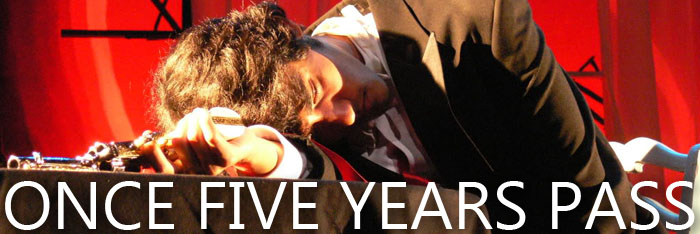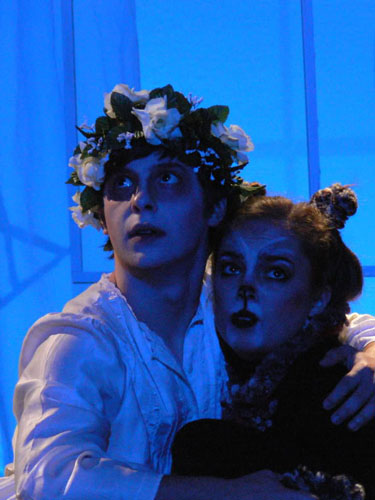
| Once Five Years Pass by Federico García Lorca, in a new translation by Gary Jaffe - Yale University Senior Thesis 2009 - Photo by Eric Anderson | ||||||||
 |
||||||||
| about | what's new | productions | resume | contact | ||||
 View the ONCE FIVE YEARS PASS gallery. Photos by Eric Anderson & Lauren Bremen |
ONCE FIVE YEARS PASS by Federico García Lorca in a new translation by Gary Jaffe directed by Gary Jaffe OCTOBER 22 - 24, 2009 at the Whitney Theatre a Yale Theatre Studies Senior Thesis for Gary Jaffe & Bobby Foley In Once Five Years Pass, a young man contemplating suicide imagines the ways his life might play out, enacting the fragmentation of his possible selves onstage, weaving the experience with fragments of memories—the death of neighborhood boys and cats—and fantasies. As the director of this beautiful but bewildering piece, I used strategic staging to clarify the central storyline. I decided that the Young Man would never truly leave his house. With only a few shifts—removing a window, hanging fabric trees, shifting furniture—his house became a different space entirely—a balcony, a forest—while remaining fundamentally the same. I cast the play similarly, having actors double in both recognizable and bizarre roles. This doubling created a theatrical experience at once outlandish and heartbreakingly real. The audience, following the the final evening of a young man's life, encountered the wonderfully strange and the achingly familiar. Featuring: Bobby Foley, Erin Capistrano, Daniel Amerman, O'Hagan Blades (both pictured left), Jacob Liberman, Will Turner, Rafa Kern, Adriel Saporta Scenic Design by Rachel Sturm; Lighting Design by Lauren Bremen; Costume Design by Zoelle Egner, Elizabeth Palazzolo and Gary Jaffe |
|||
View a montage of clips from Once Five Years Pass, featuring music composed for the play by Misha Laskin |
||||
|
Reviews Jaffe’s production is situated somewhere between a nightmare and a dream. Leaving the theater is an experience not unlike waking up in the morning: You might not be sure what exactly happened in the reverie of your subconscious, but the feeling lingers, as you know you have just experienced something great. Katie Odland, midnightatyale.com |
[The play] invites the viewer to enter and experience a very different type of world, one with its own version of reality. This play is filled with dream-like devices — masks, music, myth, poetry, fluid sets, ribbons and strong, solid colors. In the time and space of the theater, this invisible world takes on a physical reality, letting the audience experience a timeless and spaceless inner life. But in physical form, this invisible world envelops the audience in its own state of irrationality and confusion. Overall, the mysterious spectacle of the play shows the Young Man and the audience the complexity, irrationality and beauty of the “most intimate regions of ourselves,” as Jaffe says in his Director’s Note. Sage Snider, |
|||
|
Testimonial Once Five Years Pass (Así que pasen cinco años) is a very difficult play both to understand and to produce. I teach this play regularly in my undergraduate course on Lorca’s theater and poetry, and am always amazed and confounded every time I read it. Having written on Lorca and with a book in preparation on Lorca as a cultural icon, I am most appreciative of the challenges to presenting a play that for a long time was erroneously considered incomplete and, then, simply impossible to put on. Indeed, it was part of what Lorca called his “impossible theater.” Tragically, Lorca himself never saw his work on stage. I’d like to think he would have been entranced with Gary Jaffe’s production of the play. He would not have been able to appreciate the grace and wit of Gary’s translation, as Federico’s grasp of the English language was tenuous at best, but I think he would have loved the imaginative flair and the fluidity with which Gary directed his players and all the scenes. I certainly was entranced. From the opening scene in which we see the Young Man and the Old Man together, mirror images of one another speaking at cross purposes and yet connecting on other levels, to the final one, in which the Young Man has run out of time, Gary has understood the heart of the play, which is the inexpressible poignancy of not knowing how to live. The melting of dream into reality, reality into dream, theatrically express the Young Man’s existential paralysis. Gary shows how his young actors are stuck in an ever repeating temporal loop, suggesting how elusive both the passage of time and life are, how youth does not know it is young. This was a wonderful production. Noël Valis Professor of Spanish |
||||